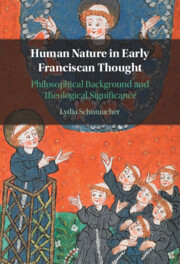4 results

Human Nature in Early Franciscan Thought
- Philosophical Background and Theological Significance
-
- Published online:
- 27 January 2023
- Print publication:
- 19 January 2023
Chapter 15 - Early Franciscan Theology
- from Part IV - The 13th Century
-
- Book:
- Introduction to Medieval Theology
- Published online:
- 15 April 2022
- Print publication:
- 24 March 2022, pp 199-231
-
- Chapter
- Export citation
Chapter 2 - The Psychological Turn and the Rise of Intellectualism
- from Part I - Free Will
-
- Book:
- Free Will and the Rebel Angels in Medieval Philosophy
- Published online:
- 26 November 2020
- Print publication:
- 03 December 2020, pp 31-57
-
- Chapter
- Export citation
2 - The Summa Halensis and Bonaventure
-
- Book:
- Thinking about Animals in Thirteenth-Century Paris
- Published online:
- 07 August 2020
- Print publication:
- 20 August 2020, pp 95-144
-
- Chapter
- Export citation

